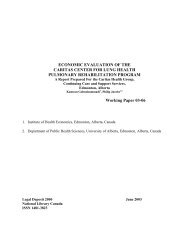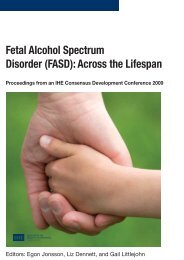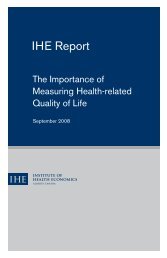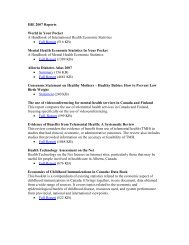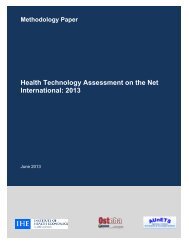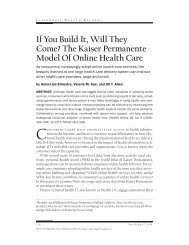The addition <strong>of</strong> a selected pharmacologic agent should be considered in <strong>adult</strong>s with a BMI≥ 27 kg/m 2 and comorbidities or with a BMI ≥ 30 kg/m 2 who are not attaining or areunable to maintain clinically significant weight loss with lifestyle and behaviouralmodification interventions. Most guidelines recommend the use <strong>of</strong> orlistat or sibutramine asan adjunct therapy, which should be considered on an individual case-by-case basis followingassessment <strong>of</strong> risk and benefit.<strong>Bariatric</strong> surgery should be considered on an individual case basis, following assessment <strong>of</strong>risk/benefit in <strong>adult</strong>s with clinically severe <strong>obesity</strong> (BMI ≥ 40 kg/m 2 or BMI ≥ 35 kg/m 2and severe comorbid disease), after appropriate non-surgical bariatric <strong>treatments</strong> have beentried and have failed to induce clinically significant weight loss. Identification <strong>of</strong> <strong>obesity</strong>relatedcomorbidities that may improve after surgery should be considered. 2,6,13 According toNICE, in <strong>adult</strong>s with a BMI > 50 kg/m 2 surgery can be <strong>of</strong>fered as the first line option,without a trial <strong>of</strong> nonsurgical bariatric <strong>treatments</strong>. 13 Multi-disciplinary care is recommended to support surgical interventions. Patients shouldonly be referred to units that are:o able to assess patients prior to surgery;o able to <strong>of</strong>fer a comprehensive approach to assessment, diagnosis, and treatment;o able and willing to provide care be<strong>for</strong>e, during, and after surgery;o able to provide long-term follow-up.These recommendations are based on data gathered from younger <strong>adult</strong> populations and there islimited evidence about their practical application in the elderly (those 65 years and older). 14,15,56,61,63,64-66,78,84-87For weight management in the elderly, it is recommended that the focus be shifted fromweight loss to maintenance <strong>of</strong> weight. The main goals are to improve physical function and QoL andto reduce dependency. The primary approach is lifestyle modification by using individualized andprudent dietary interventions and physical activity that minimizes muscle and bone loss andaccommodates concomitant chronic disease, sensory deficits, functional limitations, and livingenvironments, as well as strategies <strong>for</strong> overcoming the barriers to dietary change and physicalactivity. 61,63-65,85,86,143Pharmacotherapy <strong>for</strong> weight management is not usually indicated <strong>for</strong> the elderly with <strong>obesity</strong>because <strong>of</strong> the potential adverse effects and lack <strong>of</strong> experience in the use <strong>of</strong> bariatric medication inthis population. 61,63-65,84,87 The use <strong>of</strong> bariatric surgery <strong>for</strong> weight management in the elderly remainscontroversial due to concerns about their greater risk <strong>for</strong> perioperative morbidity andmortality. 14,15,56,61,63-65,78,120 However, bariatric surgery may be considered <strong>for</strong> obese elderly persons(those 60 years and older) who have functional impairments and/or metabolic complications thatare expected to benefit from weight loss and to improve QoL. 46,56,78,120All reviewed CPGs recommend an individualized, client-centred, comprehensive weightmanagement program to achieve realistic weight loss and weight maintenance goals. 1,2,6,7,13,27,108 Theyall acknowledge that bariatric <strong>treatments</strong> require significant lifestyle and behavioural changes andemphasize the role <strong>of</strong> working together during bariatric therapy to create a nonjudgmentalatmosphere and the need <strong>for</strong> supportive communication in medical encounters. They alsoemphasize that the decision to attempt bariatric treatment should take into account the obeseindividual's readiness to make the necessary changes.<strong>Bariatric</strong> <strong>treatments</strong> <strong>for</strong> <strong>adult</strong> <strong>obesity</strong> 28
Weight management programsThe literature search conducted <strong>for</strong> this review did not reveal any published research on the idealcomponents <strong>of</strong> a successful weight management program <strong>for</strong> <strong>adult</strong> <strong>obesity</strong>, or on requirements <strong>for</strong>implementing effective programs.According to the reviewed literature, the most effective weight management programs appear to bethose adopting a disease management/chronic care model and including the followingelements: 1,19,31,46,50,90,144-146prevention (education and public awareness campaigns);multidisciplinary care involving healthcare providers appropriately trained and experienced indiagnosing and treating <strong>adult</strong> <strong>obesity</strong>;specialized technical and equipment capacity;local administration;clinical pathways and standardized protocols based on evidence-based best practice;screening <strong>for</strong> medical and psychological risk, assessing readiness to change, and targetingindividuals with <strong>obesity</strong>-related health risks and complications;lifestyle and behavioural modification interventions, bariatric medication, and bariatricsurgery;a full complement <strong>of</strong> consultative services (including patient education and counseling onimproving dietary and physical activity patterns, and behavioural counseling);brief primary care intervention and referral <strong>for</strong> specialized support;effective patient-healthcare provider communication and partnership;the infrastructure to provide education, long-term support, and monitoring and ongoingfollow-up; outcome tracking and reporting.However, there are many patient-, provider-, and system-level barriers to providing effective weightmanagement. 1,5,8,14,18,31,48,60,67,79,90,145,147-152 A number <strong>of</strong> patient-related barriers might make it difficult<strong>for</strong> healthcare providers to initiate and provide <strong>obesity</strong>-related counseling and bariatric treatment.Individuals may be reluctant to seek medical attention. Although individuals with <strong>obesity</strong> aregenerally prepared to go through the initial stage <strong>of</strong> weight loss, they are <strong>of</strong>ten unprepared to acceptlifelong lifestyle changes and, in some cases, medication and/or surgery. Socioeconomic status canpose a significant obstacle to bariatric treatment. Lack <strong>of</strong> time is one <strong>of</strong> the most frequentlyencountered patient-level barriers. Various factors within the affected individual's socialenvironment can sabotage and undermine weight loss attempts and weight loss maintenance.Existing comorbidities and/or their treatment can promote weight gain or obstruct weight loss andweight loss maintenance. People with <strong>obesity</strong> may have psychosocial barriers to seeking, initiating, orcontinuing treatment <strong>for</strong> <strong>obesity</strong>. People with <strong>obesity</strong>, especially those with binge-eating disorder,may lack self-efficacy (which involves confidence in one’s ability to resist food in high-risk situationsand to proceed with physical activity in adverse conditions).Commonly cited provider-level barriers include:<strong>Bariatric</strong> <strong>treatments</strong> <strong>for</strong> <strong>adult</strong> <strong>obesity</strong> 29
- Page 1 and 2: Alberta STE ReportBariatric treatme
- Page 3 and 4: Alberta STE ReportBariatric treatme
- Page 5 and 6: EXECUTIVE SUMMARYSocial and System
- Page 7 and 8: Three surgical procedures—adjusta
- Page 9: Costs of Bariatric Surgery and Pote
- Page 12 and 13: Regulatory status .................
- Page 14 and 15: TABLES AND FIGURESSection One: Soci
- Page 16 and 17: ABBREVIATIONSAll abbreviations that
- Page 18 and 19: LYMmMAMDMUHCNANHLBINHSNICENIHNNHNPH
- Page 20 and 21: Bariatric physician: a licensed Doc
- Page 22 and 23: High-density lipoprotein (HDL): a f
- Page 24 and 25: Very-low-calorie diet (VLCD): a die
- Page 26 and 27: Additional Internet searches were c
- Page 28 and 29: This report addresses obesity in ad
- Page 30 and 31: Many systemic factors have been ide
- Page 32 and 33: Severe obesity is associated with d
- Page 34 and 35: eport their height and under-report
- Page 36 and 37: Also using self-reported data from
- Page 38 and 39: An examination of overall obesity d
- Page 40 and 41: Table S.2 presents the associationa
- Page 42 and 43: • have multiple focal points and
- Page 45 and 46: The main problem in any weight mana
- Page 47: food, and a negative body image. As
- Page 50 and 51: directly causes death. 61 To the ex
- Page 54 and 55: lack of formal training in nutritio
- Page 56 and 57: slightly more likely to have prescr
- Page 58 and 59: selection criteria, have facilities
- Page 60 and 61: Barriers to using appropriate baria
- Page 62 and 63: Overview of adult obesityOver the p
- Page 64 and 65: the need for regular physical activ
- Page 66 and 67: phenylpropanolamine/25. Sibutramine
- Page 68 and 69: Complianceand AdherenceDemand andut
- Page 70 and 71: Aetna Clinical PolicyBulletinswww.a
- Page 72 and 73: Overweight 123,821 172,971 157,623
- Page 74 and 75: REFERENCES1. 2006 Canadian clinical
- Page 76 and 77: 34. Gostin LO. Fast and supersized:
- Page 78 and 79: 69. Klarenbach S, Padwal R, Wiebe N
- Page 80 and 81: 105. Hill JO, Thompson H, Wyatt H.
- Page 82 and 83: 141. Ross R, Bradshaw AJ. The futur
- Page 84 and 85: 172. Arkinson J, Ji H, Fallah S, Pe
- Page 86 and 87: This section will address a set of
- Page 88 and 89: dietary therapy is to reduce total
- Page 90 and 91: Additional benefits of exercise ove
- Page 92 and 93: medications that inhibit intestinal
- Page 94 and 95: Rimonabant may be considered for pa
- Page 96 and 97: Long-term complications are specifi
- Page 98 and 99: Devices used for bariatric surgeryH
- Page 100 and 101: Description of the Included Systema
- Page 102 and 103:
AEs for sibutramineAs compared to a
- Page 104 and 105:
Evidence on Efficacy/EffectivenessW
- Page 106 and 107:
Table T.7: Effects of behavioural t
- Page 108 and 109:
SurgeryDescription of the included
- Page 110 and 111:
follow-up time was 3 years. Results
- Page 112 and 113:
group as compared to the VBG group.
- Page 114 and 115:
The authors identified many methodo
- Page 116 and 117:
The investigators pointed out that
- Page 118 and 119:
approximately 3 to 5 kilograms. For
- Page 120 and 121:
for studies with a mean age of part
- Page 122 and 123:
Examining whether use of any of the
- Page 124 and 125:
Evidence from placebo-controlled cl
- Page 126 and 127:
colorectal or gastroesophageal or f
- Page 128 and 129:
Web of ScienceISI Interface License
- Page 130 and 131:
AMA Clinical PracticeGuidelineswww.
- Page 132 and 133:
critical appraisal of the included
- Page 134 and 135:
APPENDIX T.B: EXCLUDED STUDIESTable
- Page 136 and 137:
Padwal R, Li SK, Lau DC. Long-term
- Page 138 and 139:
Quality subsection 1: At least MEDL
- Page 140 and 141:
Quality subsection 5a:Study quality
- Page 142 and 143:
Partially reported: The study types
- Page 144 and 145:
Table T.C.1: Results of quality ass
- Page 146 and 147:
Table T.C.1: Results of quality ass
- Page 148 and 149:
APPENDIX T.D: CHARACTERISTICS OF SY
- Page 150 and 151:
Table T.D.1: Characteristics of the
- Page 152 and 153:
Table T.D.1: Characteristics of the
- Page 154 and 155:
Table T.D.2: Characteristics of the
- Page 156 and 157:
APPENDIX T.E: EVIDENCE TABLE ON SAF
- Page 158 and 159:
Serious surgical complicationsSurgi
- Page 160 and 161:
LSGmMAMDNAnssORQoLRCTRDRRRYGBSBPTGV
- Page 162 and 163:
Table T.F.1-2: Weight loss - Behavi
- Page 164 and 165:
Table T.F.1-4: Weight loss - Surger
- Page 166 and 167:
Table T.F.2: Quality of life (QoL)
- Page 168 and 169:
Curioni & Lourenco 2005 58Cholester
- Page 170 and 171:
Table T.F.3-3: Risk factors/comorbi
- Page 172 and 173:
Table T.F.3-5: Long-term effects of
- Page 174 and 175:
Maciejewski et al., 2005 65Avenell
- Page 176 and 177:
Table T.G.2: Effects of bariatric s
- Page 178 and 179:
Table T.G.4: Effects of bariatric s
- Page 180 and 181:
18. Cerulli J, Lomaestro BM, Malone
- Page 182 and 183:
50. Health Canada Drug Product Data
- Page 184 and 185:
SECTION THREE: ECONOMIC EVALUATIONC
- Page 186 and 187:
Definition of bariatric surgical pa
- Page 188 and 189:
etween surgical interventions, the
- Page 190 and 191:
concluded that adding orlistat to L
- Page 192 and 193:
Weight management program (WMP) ver
- Page 194 and 195:
groups. Compared with standard care
- Page 196 and 197:
Results from Analysis of Provincial
- Page 198 and 199:
DiscussionThe objectives of the eco
- Page 200 and 201:
surgical suites, and so on. The bud
- Page 202 and 203:
APPENDIX E.A: LITERATURE SEARCH SUM
- Page 204 and 205:
CRD Databases(DARE, HTA & NHS EED)h
- Page 206 and 207:
Web of ScienceISI Interface License
- Page 208 and 209:
NEOS Librarywww.library.ualberta.ca
- Page 210 and 211:
Table E.A.2: Evidence table of revi
- Page 212 and 213:
ResultHealth outcomesCostsMarginal
- Page 214 and 215:
CostsMarginal analysisThe cost anal
- Page 216 and 217:
Time Horizon/discount rateCurrency/
- Page 218 and 219:
Objectivestudy perspective: society
- Page 220 and 221:
ResultHealth outcomesCostsMarginal
- Page 222 and 223:
ResultHealth outcomesCostsMarginal
- Page 224 and 225:
S4Economic burden of obesityMean co
- Page 226 and 227:
15. Lacey LA, Wolf A, O'shea D, Ern
- Page 228 and 229:
Author Contribution StatementsPaula



